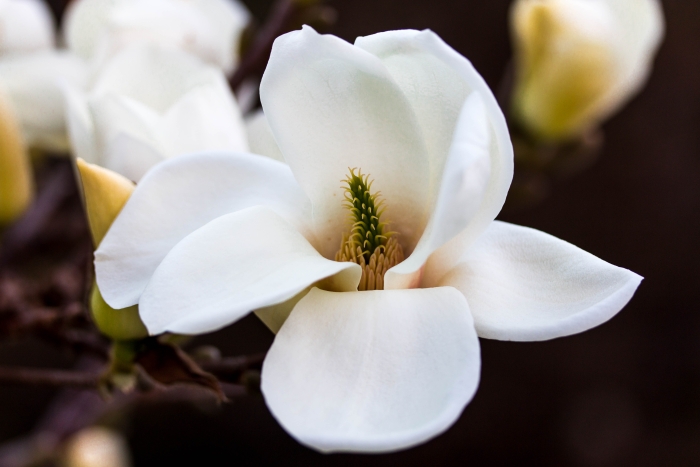Saucer Magnolia
(Magnolia soulangeana)
Saucer Magnolia (Magnolia soulangeana)
/
/

User:A,Ocram
Public domain
Image By:
User:A,Ocram
Recorded By:
Copyright:
Public domain
Copyright Notice:
Photo by: User:A,Ocram | License Type: Public domain | License URL: http://creativecommons.org/publicdomain/zero/1.0/deed.en | Uploader: A,Ocram | Publisher: Wikipedia Commons |




























Estimated Native Range
Summary
Magnolia soulangeana, commonly known as Saucer Magnolia, is a hybrid deciduous tree or large shrub resulting from a cross between M. denudata and M. liliiflora, developed in France. It typically grows to 20-25 feet (6-7.6 meters) in height with a similar spread and has a rounded, open canopy. The leaves are alternate, simple, shiny, and dark green, providing a lush backdrop for the flowers. Saucer Magnolia is celebrated for its spectacular early spring blooms, which appear before the leaves, and can be white, pink, or purple, often with a gradient. The flowers are large and showy, up to 10–20 cm (4–8 in) across, with some varieties having a pleasant fragrance. It is well-suited to temperate climates.
Saucer Magnolia is valued for its stunning floral display, ease of cultivation, and tolerance to wind and alkaline soils, which are challenging for many magnolia species. It is often used as a focal point in residential gardens, and due to its size, it is suitable for small yards. It thrives in full sun to part shade, prefers well-drained, acidic to neutral soil, and requires moderate watering. While it is generally pest and disease-resistant, it can be susceptible to scale insects and fungal diseases like leaf spot and canker. Avoid planting in exposed locations where late winter frosts can damage the early blooms.CC BY-SA 4.0
Saucer Magnolia is valued for its stunning floral display, ease of cultivation, and tolerance to wind and alkaline soils, which are challenging for many magnolia species. It is often used as a focal point in residential gardens, and due to its size, it is suitable for small yards. It thrives in full sun to part shade, prefers well-drained, acidic to neutral soil, and requires moderate watering. While it is generally pest and disease-resistant, it can be susceptible to scale insects and fungal diseases like leaf spot and canker. Avoid planting in exposed locations where late winter frosts can damage the early blooms.CC BY-SA 4.0
Plant Description
- Plant Type: Tree
- Height: 15-25 feet
- Width: 15-25 feet
- Growth Rate: Moderate
- Flower Color: Pink, White
- Flowering Season: Spring
- Leaf Retention: Deciduous
Growth Requirements
- Sun: Full Sun, Part Shade
- Water: Medium
- Drainage: Medium
Common Uses
Bee Garden, Bird Garden, Border Plant, Butterfly Garden, Deer Resistant, Fragrant, Low Maintenance, Showy Flowers, Street Planting
Natural Habitat
Garden settings
Other Names
Common Names: Praktmagnolia , Tulip Tree
Scientific Names: Magnolia soulangeana , Magnolia lennei , Magnolia ×soulangiana , Magnolia soulangeana var. brozzinii , Magnolia soulangeana var. lennei , Magnolia speciosa , Magnolia lenneana , Magnolia soulangeana f. rubra , Magnolia brozzonii , Magnolia conspicua var. alexandrina
GBIF Accepted Name: Magnolia soulangeana Soul.-Bod.